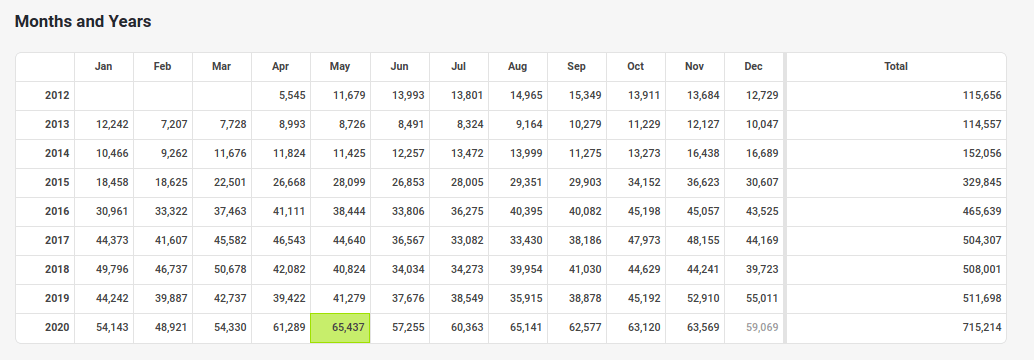
I suffer from Impostor Syndrome, and I am not alone. At least 70% of professionals report feeling Impostor Syndrome (IS) at some time during their careers (Gottlieb, 2020). Some time ago, Netflix approached me with an Anime Analyst position. This made my IS flare! After all, I can speak only toddler Japanese, and this job wanted a fluent speaker. I should have been flattered that Netflix would offer such a job. Instead, it sparked a spiral of thinking that dinged my self-esteem and raised my anxiety and blood-pressure for a week: classic symptoms of Impostor Syndrome.
Impostor Syndrome is the inability to accept your success despite receiving praise, earning degrees, earning scholastic honors, and receiving recognition. No matter what external factors happen, such as the Netflix offer, people with do not feel an internal sense of success (Gottlieb, 2020; McGregor, 2008). To put it simply, you feel like a fraud.
I’ve studied anime, American otaku culture, and its context for over 10 years. I even studied manga and anime as part of my Masters degree–yes, you can do this; library and information science is cool like that. Yet, I feel like a fraud sometimes. IS like this comes from a disconnect between your expectations of success and what success really is. For me, success as an anime expert would be fluency in Japanese, a professorial job teaching history/anime, and freedom to set my own schedule. Japanese fluency will be a long time coming, if ever. You see, I have an incurable hearing problem that will likely make me deaf. The nerve damage already makes tonal variations, variations Chinese and Japanese feature, beyond my ability to hear. So you see, I have many reasons to feel IS.
Yet all of this is also false.

I am already successful. The Netflix job offer, even though it is beyond my qualifications, shows this. The fact you are reading this post shows this. Impostor Syndrome is just a faulty way of thinking. It tends to catastrophize, such as how I view my hearing problems against learning Japanese. IS is the habit of looking for self-sabotaging thoughts. Depression shares this habitual thinking. In fact, depression and IS share many links, and IS can mask depression in people (McGregor, 2008). IS and depression center on comparing yourself to others and toward unrealistic thoughts of success. People who fear failure, who often have IS, also tend to set their goals unrealistically high or unrealistically low so they don’t have to try (Fried-Buchalter, 1992). Again, this remains a disconnect from reality and thinking.
Setting a high goal can lead to failure, but you learn much on the way. I still study Japanese despite the high hurdle it poses. Do I burnout because of the slow progress? You betcha! But I keep returning to Japanese after a rest period. In fact, burn out, emotional exhaustion, and work-family conflicts are causes of Impostor Syndrome (Gottlieb, 2020). In Gottlieb’s study of doctors, women and minority physicians report higher rates of Impostor Syndrome. This appears to be, at least in part, because of burnout.
So to get to my point: you aren’t alone if you feel like a fraud. Impostor Syndrome comes from burnout, stress, depression, and your faulty thinking about success. Remember, over 70% of professionals deal with this. And the feeling extends to all aspects of life not just career and hobbies. IS can infect your relationships and even make you feel as if are a kid faking adulthood. Feeling like an impostor can make you want to give up blogging about anime or writing or creating YouTube videos. Of course, it’s all well and good to know this, but how do you deal with Impostor Syndrome when it strikes?
How to Deal with Impostor Syndrome

Fortunately, dealing with IS is pretty simple. Not easy, but simple. In part, you have to learn to ignore the rigid ideas of success society foists on you. Most cultures have arbitrary ideas of when you need to hit life milestones: marriage, kids, a nice home, a steady job, and the like. However, who is to say when or even if you achieve these things? Does the fact I don’t want kids make me less of a success? Of course not! But it ignoring your culture’s norms isn’t easy, especially if your culture is highly structured. I’m fortunate as an American in that regard.
There are 5 more ways to deal with Impostor Syndrome (Stuart, 2018):
- Own your success.
- Don’t let your doubt and fear stop you.
- Let go of perfectionism.
- Realize no one can see your thoughts, but they may share them.
- Stop comparing yourself to others.
To own your success means you acknowledge you have succeeded in something. You started an anime blog. You drew that picture. You internally accept your success. When you consider it, the fact you aren’t motivated by external rewards is a strength. You are less susceptible to chasing such rewards. So this “symptom” of IS can be a success!
When I started writing, I faced many doubts and fears. I pushed through them and keep pushing through with the start of each writing project.
Perfectionism gets in the way of progress. Perfection is impossible to reach, which ties back to the fear of failure and the feeling of never measuring up. Imperfection is perfect. In Japanese this idea is known as wabi-sabi.
Because each of us are trapped in our heads, we forget no one else can see our thoughts. However, most (over 70%) people have had the same type of thoughts, the same feeling of never measuring up.
When you stop comparing yourself to others, your sense of success shifts. It is silly to compare yourself to others. This reminds me of a bushido proverb: “I don’t know how to surpass others; I only know how to outdo myself.” Everyone has different circumstances and goals. Life isn’t a race. Life is a hike through a woodland. Sometimes you find a path to help you along. Most of the time, you have to cut your own path. You set your own milestones, be it that tree in the distance or that bush just ahead of you. Most of the time, you will walk alone. This allows you to set your own pace and sight see as you would like to do.
Your thoughts define your view of reality. After all, as Heraclitus wrote, “The soul is dyed the color of its thoughts.” By shifting your thinking around these 5 areas, you can combat feeling like a fraud. This doesn’t mean you won’t keep feeling that way. I certainly do! However, it does mean you don’t have to be stopped by those thoughts and feelings.
The Anime Hobby and Impostor Syndrome

If you are a fan of anime, you are a true fan. The anime community sometimes argues about who are true fans and who are impostors using arbitrary measures. Dubs vs. subs, waifu, or even what shows you watch all act as measures. If you write about anime and enjoy it, you write about anime and enjoy it. There’s no fraud involved in that. You don’t understand Japanese? It doesn’t matter. You don’t like Gundam or One Piece? It doesn’t matter. Do you watch dubs exclusively? That’s okay. Remember step 5? Don’t compare yourself to others.
If you are wondering, I didn’t take the Netflix job. Even if I had the level of Japanese they want, their corporate culture isn’t suited for someone of my temperament. However, the offer made me realize what I write is a success, that I’m not a fraud. I know I shouldn’t look for such an external validation; however, it forced me to reconsider my internal measures of success too. Look for your own validation. Did someone find your forum post helpful or your blog article? Own that success! Did you reach your goal of writing blog articles regularly for a single year? Own that success!
Impostor Syndrome is just another way we make life unnecessarily difficult for ourselves. Enjoy anime. Enjoy writing about it or vlogging about it. Let that enjoyment be your success.
References
Fried-Buchalter, S. (1992). Fear of Success, Fear of Failure, and the Imposter Phenomenon: A Factor Analytic Approach to Convergent and Discriminant Validity. Journal of Personality Assessment, 58(2), 368. https://doi-org.oh0164.oplin.org/10.1207/s15327752jpa5802_13
Gottlieb, M., Chung, A., Battaglioli, N., Sebok, S. S. S., & Kalantari, A. (2020). Impostor syndrome among physicians and physicians in training: A scoping review. Medical Education, 54(2), 116–124. https://doi-org.oh0164.oplin.org/10.1111/medu.13956
McGregor, L. N., Gee, D. E., & Posey, K. E. (2008). I Feel Like a Fraud and It Depresses Me: The Relation between the Imposter Phenomenon and Depression. Social Behavior & Personality: An International Journal, 36(1), 43–48. https://doi-org.oh0164.oplin.org/10.2224/sbp.2008.36.1.43
Stuart, J. (2018). 5 Ways to Deal with “Imposter Syndrome.” NZ Business + Management, 32(11), 48.




A great success story that you have there. I strongly agree that perfectionism can hold us back from taking risks and trying new things, as we fear failure and judgment. However, by letting go of the need to be flawless, we open ourselves up to growth and learning. Impostor syndrome often stems from the belief that we are not good enough or deserving of our successes. By accepting that we are not perfect and that it’s okay to make mistakes, we can release the self-doubt that fuels impostor syndrome.
As with any improvement, overcoming impostor syndrome takes patience and persistence. Perhaps most of all, we need to learn to view failures as experience points!
Hey congratulations on the netflix offer. You deserve it! For the impostor syndrome, i will say only if Paul McCartney can feel like an impostor, you can also feel like one. It’s totally fine. Congrats again on the offer. Good luck in that, you deserve it.
Thank you! It turns out I wasn’t qualified, but it was still cool to learn more about Netflix’s inner workings.
I’ve written a post about IS a long while back and yeah, it creeps up time and time again. Lately, I felt the name Manga Therapy for me was inappropriate and wanted to change my blog name for a while now. But I was worried about all the lost traffic and pain of setting up seemed daunting as I’ve been in the blogging game for 12 years now.
Thankfully, I managed to change my blog name and URL. Granted there’s work to be done still on the backend (301 redirects are a pain in the butt), but I did it. Plus I don’t really care too much about web traffic as of late. So now I’m Drop-In to Manga, which is better-sounding for the person I am now versus then.
In a strange way, I felt Manga Therapy was somewhat of an imposter (i.e. not a mental health professional). I changed my perspective in that I wasn’t being an imposter; I just learned more about alternative ways of thinking about mental health care compared to traditional means and how the medical model can fail people sometimes.
That is quite a bold move! I’ve considered changing JP’s domain, but I haven’t taken the plunge for all the reasons you listed. When you have a lot of articles (which I know you do!) all the connections become brittle. You weren’t an imposter in how you presented what you’ve learned. Imposter Syndrome is a signal of someone who is thoughtful about themselves, as long as it doesn’t paralyze anyway. In some ways, it’s better than the Dunning-Kruger Effect.
I’ve used your articles to help my library’s staff develop our manga collection, so thank you and keep up the good work!